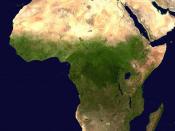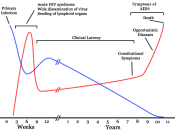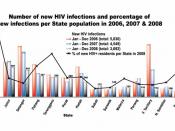AIDS in the World
Acquired Immunodeficiency Syndrome (AIDS) is human viral disease that ravages the immune system, undermining the body's ability to defend itself from infection and disease. Caused by the human immunodeficiency virus (HIV), AIDS leaves an infected person vulnerable to opportunistic infections.
In fact, the teenagers are most typically affected by AIDS and also people who have sexual contact with someone who has HIV. As of the end of 2003, an estimated 40 million people worldwide - 37 million adults and 2.5 million children younger than 15 years - were living with HIV/AIDS. Nowhere is this better demonstrated than in sub-Saharan Africa, where the number of AIDS cases far exceeds that of all other geographic regions. Of the estimated 14,000 HIV infections that occur each day worldwide, about half of these infections occur in sub-Saharan Africa. About 70 percent of all people infected with HIV live in this region.
In some countries in the southern part of the continent, including Botswana, Lesotho, Swaziland, and Zimbabwe, more than 30 percent of the population has HIV infection or AIDS.
The only way to determine whether you are infected is to be tested for HIV infection. You can't rely on symptoms to know whether or not you are infected with HIV. Many people who are infected with HIV don't have any symptoms at all for many years. While no medical treatment cures AIDS, in the relatively short time since the disease was first recognized, new methods to treat the disease have developed rapidly. Health-care professionals focus on three areas of therapy for people living with HIV infection or AIDS: antiretroviral therapy using drugs that suppress HIV replication; medications and other treatments that fight the opportunistic infections and cancers that commonly accompany HIV infection; and support mechanisms that help people...



Useful information about such a terrible disease.
Coming from South Africa, I know all about these problems - the fact that 1 in 5 people here have AIDS is enough to scare you off sex for life! Be careful, use a condom guys!
3 out of 3 people found this comment useful.